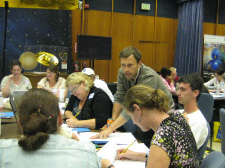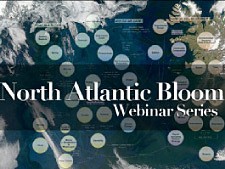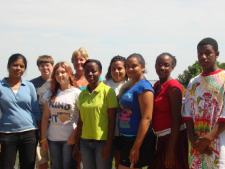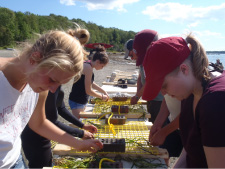COSEE-OS has had a busy year, completing the end of a no-cost extension to our original five-year grant in August 2011. Highlights of our work, since May 2011, are summarized below.
Concept Linked Integrated Media Builder
COSEE-OS continues to refine the suite of software tools collectively known as the Concept Linked Integrated Media Builder (CLIMB) based on user imput. In addition to providing online media that aids learners in better understanding the context of the oceans in both the earth and solar systems, COSEE-OS has piloted effective ways to bring these tools - and the relevance of the oceans to classrooms - to rural and inland audiences through workshops, webinars, and classroom visits.
As of June 1, 2012, CLIMB had 2,779 registered users (an increase of 780 over 12 months) who had made 6,519 concept maps (an increase of 2,225 over 12 months). Ninety-nine maps had been published as “Public Maps,” including all maps created by scientists during COSEE-OS workshops and webinars. Anyone can submit maps to COSEE-OS staff for consideration to be published online. Any user can also embed concept maps on his/her webpage (click here for the Embed Widget tutorial).
NASA Aquarius Launch and Workshop at JPL | |
NASA scientist Felix Landerer describes his research to workshop participants at the Educator-Scientist Collaborative at JPL | |
In June 2011, COSEE-OS conducted a
scientist-educator collaborative (SEC) workshop at the NASA Jet Propulsion Laboratory (JPL) in Pasadena, CA. Day 1 of the workshop featured five NASA scientists who worked collaboratively with educators to examine connections between the water cycle, ocean circulation, climate and sea surface salinity. On Day 2, educators received an overview of the development of Aquarius instrument technology by Project Scientist Yi Chao, toured JPL facilities, attached scientist-vetted content (e.g., animations and images, news items) to their online concept maps, and conducted “hands on” activities that support workshop themes. This event tripled the number of educators in any previous SEC workshop, thus demonstrating scalability of the model.
School District Collaboration WorkshopPiloted in July 2011 at Colby College, this four-day
Curriculum Development Workshop model provided 17 educators a full framework of content, data, and activities to serve as a foundation for curriculum development. Five UMaine faculty and five “education-interested” marine sciences graduate students worked in small teams with educators to develop concept maps, attach multimedia assets, train in the use of scientist-provided data sets and “hands on” activities. In addition to the primary goal of educator professional development, a key objective was to foster continuing relationships between the educators and graduate students.
| |  |
| The NAB webinar series tells the story of the North Atlantic spring phytoplankton bloom and its role in the ocean ecosystem |
North Atlantic Bloom Webinar SeriesThis
five-part webinar series focused on the research of North Atlantic Bloom (NAB) scientists from University of Washington (Eric D’Asaro, Craig Lee), Bigelow Laboratory for Ocean Sciences (Nicole Poulton), University of Maine (Mary Jane Perry, Ivona Cetinic), and Woods Hole Oceanographic Institution (Amala Mahadevan, Melissa Omand). Each webinar session featured specific teacher-friendly datasets – primarily developed by post-doc Ivona Cetinic -- based on data collected during NAB cruises.
Evaluation data for the webinar series revealed that 68 unique participants from 21 states and three non-U.S. countries (Canada, Iceland, and Germany) attended NAB webinars (over 30% of which were faculty/researcher or graduate students). The NAB webinars’ archives have had 4,237 page views, making it the second most visited section of the COSEE-OS website. The publication of NAB research results in
Science (Jul 2012) is likely to increase interest in the webinar series’ archived resources.
Graduate Student/Faculty Collaborative Workshops
The last of the four Graduate Student/Faculty Collaborative workshops was held at Scripps Oceanographic Institution (UC San Diego) in October 2011. Like the three workshops before it (UMaine, University of Southern California, Rutgers University), this event teamed a more experienced scientist (e.g., faculty member) with a small group of less experienced scientists (e.g., graduate students) to collaborate on how to effectively share content with “3rd party” non-scientists (i.e., undergrads). This model is based on a series of COSEE-OS “Scientist-Educator Collaborative Workshops” conducted in 2008-2010.
Many Learning Pathways in the Ocean Sciences Webinar Series| |  |
| Grad student Lonnie Gonsalves engages underrepresented K-12 students in aquatic sciences activities |
In October 2011, COSEE-OS and the Institute for Broadening Participation continued the Many Learning Pathways in Ocean Sciences (Pathways) webinar series piloted in May 2011 with three presentations:
The Pathways webinar series features ocean and climate scientists paired with education scientists from across the country. The series highlights scientists making significant contributions in their fields and allows for the sharing of successful strategies for increasing diversity in the ocean sciences community.
Broader Impacts Workshop II
As a follow-up event to the Broader Impacts workshop held at the Seacoast Science Center in March 2011, COSEE-OS partners at the New England Ocean Sciences Education Collaborative (NEOSEC) showcased a spectrum of broader impact models for scientists to partner with formal and informal education programs at the Waquoit Bay National Estuarine Research Reserve in November 2011.
One key outcome of this workshop was giving participants an opportunity to apply for “mini grants” to fund scientist-educator collaboration. Six proposals were received from attendees and the following three will be funded through COSEE-OS:
- Silent Spring Revisited: Rachel Carson’s Legacy and Ocean Health Today submitted by Cornerstones of Science and Marine Educational Research Institute;
- Right Whales and Ocean Observing: An Exhibit that Connects People to Research submitted by the Northeastern Regional Association of Coastal Observing Systems and Stellwagen Bank National Marine Sanctuary; and
- Paths to Dissertation: Encountering Graduate Student Experiences and Research submitted by Northeastern University Marine Science Center.
Click here for more information on these grants.
Aquarius Mission Webinar SeriesJune 2011 marked the launch of NASA's first space-based measurements of ocean salinity across the globe - an important observation for ocean and climate studies. From 650 kilometers (400 miles) above Earth's surface, Aquarius detects changes in ocean salinity as small as a "pinch" of salt in a gallon of water. NASA Aquarius works closely with COSEE-OS for its Education and Public Outreach (EPO) endeavors, including this webinar series:
NASA's Aquarius Studies Our Salty Seas. NASA scientists Yi Chao, Gary Lagerloef and David Le Vine came together for this two-part series to discuss the complexities of getting accurate salinity measurements from space. They also showed global maps produced by Aquarius since the instrument began collecting data in August 2011. The webinars reached 75 unique participants from 25 states and Puerto Rico, India and Poland. The audience of formal and informal educators, students and researchers found the presentations highly relevant and 93% of those surveyed (n=27) plan to “use the subject matter in their work.”
NASA's Aquarius in the Classroom Webinars on Inquiry-based Teaching. Dr. Susan Lozier (Professor, Duke University) discussed how our ability to construct knowledge about the ocean has evolved over time, primarily through the acquisition of satellite data. Ted Taylor (High School science teacher) showed how selected inquiry-based labs are used to engage students in the scientific process and help them develop skills needed for future science classes. Forty-three (43) participants from 17 states and Puerto Rico attended the live events. Twenty-five of the participants (58%) completed a post-webinar survey and all stated that they plan to use the webinar's content in their own work.
These webinars and associated resources are available online - further increasing the reach of the presentations.
Professional Development Workshop for Early Career Scientists
In Februray 2012, COSEE-OS partnered with three Centers – Networked Ocean World, California, and OCEAN – to conduct a full-day workshop for 28 recruited early-career scientists immediately prior to the 2012 Ocean Sciences Meeting in Salt Lake City. The event was followed on by a series of bi-weekly webinars that include presentations by the Early Career Scientists sharing how they’ve used their new skills. Thanks to very positive participant feedback, Woods Hole Oceanographic Institution requested that the COSEE group hold an in-person workshop at their campus in May.
ROLE Model Webinar SeriesAs part of a collaborative partnership between Mount Desert Island Biological Laboratory (MDIBL) and COSEE-OS, Dr. Hilary Neckles (USGS) presented
Essential Eelgrass: Ecology of a Vital Resource in Maine's Coastal Waters. This ROLE Model webinar highlighted eelgrass in Maine's coastal waters - it's range, its services, its threats, and efforts to preserve it. Her concept map-based presentation includes resources to learn more about eelgrass ecology and conservation, as well as links to educational programs at MDIBL.
NASA Aquarius New Global Salinity Data: Spicing up STEM in the ClassroomAt this year's National Science Teachers Association meeting in Indianapolis, COSEE-OS teamed with NASA’s Aquarius Education and Public Outreach efforts to offer educators several opportunities to explore Aquarius global sea surface salinity datasets and concepts. Venues included a one-hour hands-on NASA workshop, two 20-minute demonstration talks at the NASA Exhibit Booth, and a 30-minute presentation during a daylong COSEE session. In the NASA Booth, Christy Herren showcased Aquarius datasets and visualizations on a high-definition monitor. The hour-long NASA workshop allowed Phoebe Jekielek to share the STEM package that Aquarius has to offer, including online data tools, "hands on" educational activities, and guidance on how to incorporate these resources into curricula. During the COSEE session, educators learned about the Aquarius
webinar series' archives that showcase scientist-constructed maps.
Paths to Dissertation: Encountering Graduate Student Experiences and Research
In April 2012, COSEE-OS hosted a Graduate/Faculty Collaborative Workshop at the Northeastern University Marine Science Center (NUMSC) in Nahant, MA. The workshop focused specifically on working with participating research faculty and graduate students to use concept mapping as a tool for deconstructing complex science for high school students. The workshop culminated in the graduate students presenting concept maps to a group of Nahant High School students who provided feedback on the use of appropriate jargon and content as well as their overall presentation skills. This workshop was funded by a mini-grant from the New England Ocean Sciences Education Collaborative in partnership with COSEE-OS to encourage collaborative approaches to fulfilling scientists' Broader Impacts requirements.
Mount Desert Island Biological Laboratory Opportunities for COSEE-OS School District Partners | |  |
| Students and teachers tie eelgrass to grids as part of restoration efforts on Frenchman Bay |
Dr. Jane Disney directs the education and research activities of the Community Environmental Health Laboratory at MDIBL. A former biology teacher at MDI High School, Jane has been working with local teachers and students on water quality related to public health as well as issues related to marine habitat loss and restoration.
Thanks to a recent EPA Environmental Education Grant, MDIBL has offered a number of field-based opportunities for teachers in COSEE-OS targeted school districts, including:
- April Break Young Environmental Leaders. Two or three teachers and their students can spend April break on the MDIBL campus, building leadership skills while engaging in environmental monitoring and marine habitat restoration work. View the April 2011 program here.
- Teacher Workshops on Marine Habitats and Global Climate Change. Teacher interns will work side-by-side with MDIBL eelgrass researchers affiliated with the Community Environmental Health Laboratory to hone field research and laboratory skills and deepen experiential knowledge through participation in a variety of environmental projects including community-based eelgrass restoration in Frenchman Bay. View the August 2011 program featuring Bangor High School students here.
- Summer Teacher Internships. High School science teachers from inland schools will spend a week working side-by-side with eelgrass researchers and college interns in the Community Environmental Health Laboratory, gaining project skills and experiences to take back to their classrooms.
Visit COSEE-Ocean Systems!

